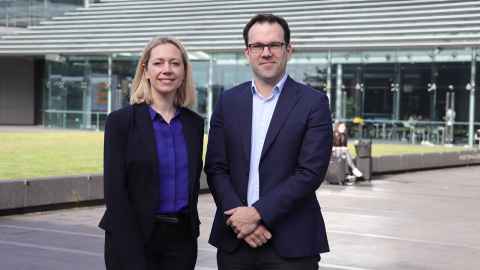Antje Fiedler and Ben Fath
Dr Antje Fiedler and Dr Benjamin Fath, senior lecturers at the Graduate School of Management, on barriers to international success and how to overcome them.

Overcoming the tyranny of distance: Strategies for the success of New Zealand SMEs in international markets
It has always been tough for New Zealand SMEs* to break into new international markets. Despite successive New Zealand governments being very good at at negotiating free trade deals and facilitating open market conditions, there is still a 30% disparity between our “policy settings” and our actual productivity, according to OECD statistics.
The tyranny of distance is a major issue that can only be partially resolved through the connectivity of digital technology because, Antje and Ben say, doing business in these markets still relies heavily on the trust and confidence built through personal contact.
This in itself is difficult for smaller companies whose founder or CEO may also be the day-to-day manager and/or key decision maker. He or she cannot afford to spend the time (and often, the money) to travel to new markets and build essential relationships with potential local partners. This is especially true if the company is attempting to innovate new product as well as develop new markets. Success comes at a very high price, if the driver of that success is working 80 hours a week!
As part of their research on succeeding in international markets, Antje and Ben conduct regular workshops with key personnel of SMEs who are looking to export their product to new markets, particularly Asian markets. There are a number of ways to mitigate the issues these companies face, say Antje and Ben.
Building up knowledge of the potential market is fundamental: by learning from the experience of other companies who have achieved their goals, for example, or co-opting business students to do some prior market research. Then “putting a toe in the water” to begin with, rather than jumping in the deep end without any guarantee of a positive outcome. This can be achieved by initially experimenting with different partners in the market, making a small commitment that they can afford to lose (the principle of “affordable loss”). Adopting this principle can open up multiple opportunities.
If it is a family-owned business or there is a trusted partner on board, managers may be able to delegate relationship-building responsibilities. The person(s) entrusted with this role will need to spend quite a lot of time in the potential market, in order to identify suitable partners and learn how to work closely with them through shared goal-setting, adopting local business practices and demonstrating commitment to a personal relationship. Such close partnerships not only create loyalty but also help New Zealand managers to develop a feeling for local customer needs, to understand the reasons for local adaptation, and to learn about local customer preferences.
In summary, to succeed in international markets, companies need to build network partnerships overseas to access relevant market knowledge, as well as internal capabilities and structures that allow them to learn quickly about overseas markets.
*For the purposes of Antje and Ben’s research an SME is defined as a company with up to 250 employees.